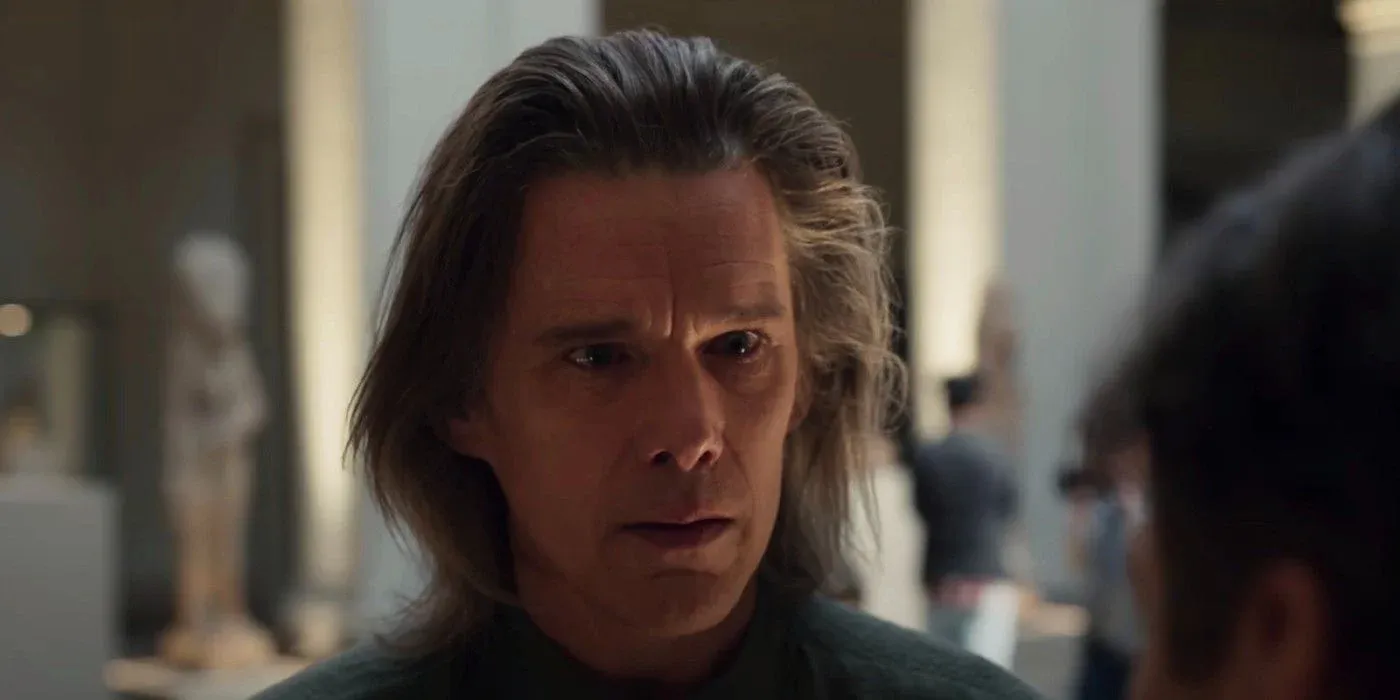The following contains spoilers for Episodes 1 and 2 of Disney+'s Moon Knight.
The first episode of Moon Knight, "The Goldfish Problem," set up the Egyptian god Ammit and her avatar, Arthur Harrow, as the antagonists of the show, creating what appeared to be clear lines of threat. The episode certainly implied that Marc Spector's Moon Knight was sent by Khonshu to save the world from Ammit's absolute judgment, embodied by Arthur Harrow and his fanatic cult. Yet, first impressions are not what they seemed for the calm, steely-eyed cult leader Harrow and Marc Spector, who may both be trapped in the web of the gods they serve.
In Episode 2, "Summon the Suit," Khonshu makes more of an appearance, some of Marc Spector's life is revealed, including his wife Layla, and we learn Arthur Harrow was once Khonshu's avatar before he defected to Ammit's cause. In the course of one conversation with Steven Grant, Harrow reveals not only some of Khonshu's secrets but an underlining bitterness he still holds toward the god. It begs the question of what happened between them, and how and why Harrow jumped ship to Ammit's service.

Yet, did Harrow get a better deal with Ammit? He claims to be doing more good, cleansing evil from the world, and certainly has amassed many devoted followers, willing to do his bidding. And the argument stands that he has improved lives, but at what cost? Harrow traded disillusion and servitude for blind faith, a faith he doesn't question. When Steven Grant raises uncomfortable questions about Ammit's plans, Harrow simply stares, as if Steven is a lost child who can't understand that the adults know best. There is resignation and weariness to Harrow's manner, the demeanor of someone no longer willing to abide opposing views or debate. He wants to save the world but doesn't want the responsibilities or the consequences. Surrendering to Ammit's will gave him a new purpose, and she's more than willing to take advantage of his embittered cynicism, allowing him to rationalize his violent actions as something for the greater good.
Marc Spector on the other hand is fully aware he has made a deal with a manipulator. The exchanges between his character and Khonshu expose how the deity is playing on Marc's gratitude for the god saving his life, his guilt over his actions as Moon Knight and his fear that his wife Layla may end up as the god's next avatar. It's obvious Marc wants out of the deal but doesn't know how to end his service without putting Layla in danger, or how to out-manipulate a god; he's clinging to the hope Khonshu will keep his word and let him go. Yet there is a sense, reinforced by Harrow's remarks about his own experience of being Khonshu's avatar, that Marc is bound to a god willing to rewrite the deal to suit his own purposes.

These two men are reflections of one another: the past self and the future to come. With Harrow revealing he was once a servant of Khonshu, Marc glimpsed what may be his ultimate end: broken and discarded. Harrow was Marc at some point until he was no longer of any use to Khonshu, but even with that similarity Marc Spector and Arthur Harrow differ in one particular way. Harrow has embraced his new role, sublimating whatever morals he had, while Marc, and now Steven Grant as well, are still fighting for their freedom. Yet, in the face of such power, can either of them be rid of the shadow of their god?
For both avatars are being shaped by their needs within the narrow confines of the prisons set by their deities, while buffeted by Ammit's and Khonshu's agendas. Ammit's sacrificial end-goals speak volumes about her lack of empathy and a fixation on pre-determined destiny and control. Khonshu has exhibited traits of impatience and arrogance as well as a ruthless, violent nature prepared to exploit human beings to achieve his goals. They are adversarial players in a long-running game, and their avatars are only pawns. Escape for either Harrow or Marc could be impossible.
The first two episodes of Moon Knight are available to stream on Disney+, with new episodes debuting on Wednesdays.


